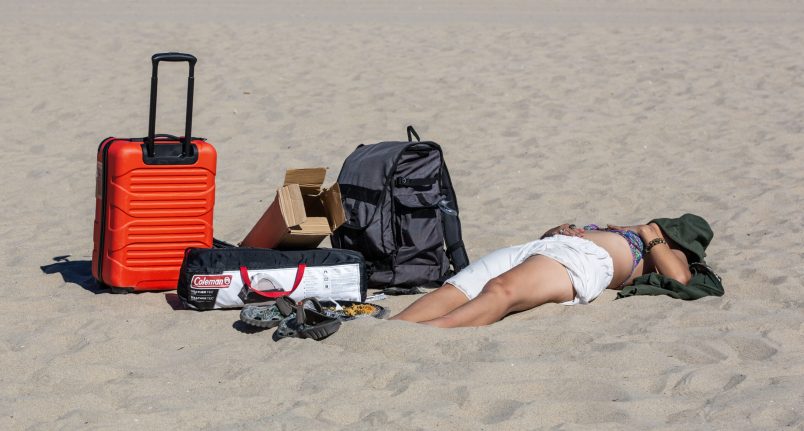☀️ I will not rain on this bipartisan parade.
It might be different for some readers living outside the congested, dirty, germ pools that are NYC and other U.S. cities (I say this with the purest affection for said congestion, dirt and germs), but if the pandemic has rallied our addled, depressed brains around any one cause, it’s the important reprieve that the outside world brings. And with it good weather — produced by the flighty temptress that is the sun.
In the early days of COVID quarantine two years ago (kill me), I developed a newfound fascination with the Weather Channel, as my sanity was a slave to its whims. If the weather was shit, the day was reduced to yet another indoor ordeal, trapped by the bleakness and nauseating familiarity of these four walls. If the sun was out, the evening held the enchantment of boundless potential. Or just, like, a nice long walk at dusk.
Many of us experienced it: the grounding, albeit maddening, return to crunchiness, with the joys and dumpiness of life all mandated by the rising and falling sun. It was a return to our primitive roots, or just the reluctant acceptance, during a truly trying time, of baseline needs. Vitamin D is good for the bones.
Anyways, the Senate apparently agrees.
In what is, supposedly, a controversial issue, the Senate passed a bipartisan bill today that would make Daylight Saving Time permanent in all states across the U.S. TIL 20 of the 48 states that observe Daylight Saving Time have already introduced bills that would make year-round daylight permanent. The legislation, coined the Sunshine Protection Act, was sponsored by Sens. Marco Rubio (R-FL) and Sheldon Whitehouse (D-RI) and passed via unanimous consent in the upper chamber.
“You’ll see it’s an eclectic collection of members of the United States Senate in favor of what we’ve just done here in the Senate, and that’s to pass a bill to make Daylight Savings Time permanent,” Rubio said from the Senate floor today. “Just this past weekend, we all went through that biannual ritual of changing the clock back and forth and the disruption that comes with it. And one has to ask themselves after a while why do we keep doing it?”
As is the case with many norms and rituals in this country, it’s a good question from Marco. (It’s also truly unsettling that the only thing that pushes senators to shake hands enthusiastically across the aisle is the necessity of … there being light outside after work ends each day.)
There have been studies published about the benefits of making Daylight Saving Time permanent in the U.S. for years, focused on issues like preventing car accidents. The argument against deviating from the 1960s-established norm (pushing clocks forward an hour in the spring and shifting it back an hour in the fall) has been centered on the idea that shoving sunset time back an hour would save electricity (an unproven theory). The belief that human lawmakers could literally dictate the reality of time started in the U.S. as a World War I-era energy saving tactic. And it’s remained the norm in the U.S. for (in my opinion) reasons that feel distinctly capitalistic: hoarding the earth’s most luminant sunshine hours for the most productive times of the day, during the dreaded 9 to 5.
But the pandemic has changed so much of that rationale for so many Americans, as working from home remains the rule for countless employees two years into the pandemic. I don’t know if that thinking played any role here — the decision to take up this bill in the Senate during a time of literal war and global upheaval seems mostly rooted in senators’ feelings of dishevelment (like the rest of us) after Sunday’s “spring forward.”
It’s unclear if the House will even take up the Senate-passed bill, let alone if President Biden would sign it into law (but theres’s a good chance he would — the quaintness of bipartisanship has a special place in Joe’s heart).
But it’s a unifying message that even the cynical among us will have a hard time arguing with: the sun, it is good.
The Best Of TPM Today
Here’s what you should read this evening:
The latest from Josh Kovensky, in TPM Prime: How One Odessan Fled The Russian Onslaught | Talking Points Memo
Be sure to catch up on our live coverage here: Russia’s Assault On Kyiv Continues As Foreign Leaders Visit Ukraine’s Capital
From TPM Cafe: Putin Puts International Justice On Trial – Betting That The Age Of Impunity Will Continue
Raskin Withdraws From Fed Job After Republican, Manchin Opposition
Yesterday’s Most Read Story
A Palimpsest of the Past — Josh Marshall
What We Are Reading
Putin’s Propaganda Machine Is What America’s Far-Right Wants — Kevin Baron
Opinion: The Supreme Court has declared open season on constitutional rights — WaPo Editorial Board
Local Newspaper Slams Rep. Madison Cawthorn: ‘North Carolina’s Gift To Crazytown’ — Lee Moran






